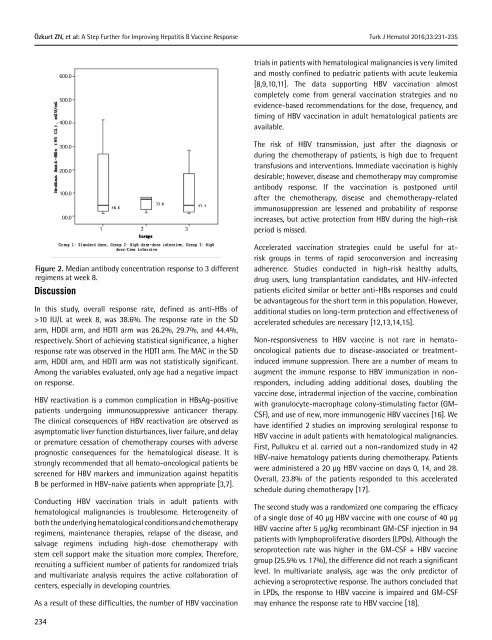Turkish Journal of Hematology Volume: 33 - Issue: 3
You also want an ePaper? Increase the reach of your titles
YUMPU automatically turns print PDFs into web optimized ePapers that Google loves.
Özkurt ZN, et al: A Step Further for Improving Hepatitis B Vaccine Response<br />
Turk J Hematol 2016;<strong>33</strong>:231-235<br />
600.0<br />
500.0<br />
400.0<br />
trials in patients with hematological malignancies is very limited<br />
and mostly confined to pediatric patients with acute leukemia<br />
[8,9,10,11]. The data supporting HBV vaccination almost<br />
completely come from general vaccination strategies and no<br />
evidence-based recommendations for the dose, frequency, and<br />
timing <strong>of</strong> HBV vaccination in adult hematological patients are<br />
available.<br />
300.0<br />
200.0<br />
100.0<br />
00.0<br />
1 2 3<br />
The risk <strong>of</strong> HBV transmission, just after the diagnosis or<br />
during the chemotherapy <strong>of</strong> patients, is high due to frequent<br />
transfusions and interventions. Immediate vaccination is highly<br />
desirable; however, disease and chemotherapy may compromise<br />
antibody response. If the vaccination is postponed until<br />
after the chemotherapy, disease and chemotherapy-related<br />
immunosuppression are lessened and probability <strong>of</strong> response<br />
increases, but active protection from HBV during the high-risk<br />
period is missed.<br />
Figure 2. Median antibody concentration response to 3 different<br />
regimens at week 8.<br />
Discussion<br />
In this study, overall response rate, defined as anti-HBs <strong>of</strong><br />
>10 IU/L at week 8, was 38.6%. The response rate in the SD<br />
arm, HDDI arm, and HDTI arm was 26.2%, 29.7%, and 44.4%,<br />
respectively. Short <strong>of</strong> achieving statistical significance, a higher<br />
response rate was observed in the HDTI arm. The MAC in the SD<br />
arm, HDDI arm, and HDTI arm was not statistically significant.<br />
Among the variables evaluated, only age had a negative impact<br />
on response.<br />
HBV reactivation is a common complication in HBsAg-positive<br />
patients undergoing immunosuppressive anticancer therapy.<br />
The clinical consequences <strong>of</strong> HBV reactivation are observed as<br />
asymptomatic liver function disturbances, liver failure, and delay<br />
or premature cessation <strong>of</strong> chemotherapy courses with adverse<br />
prognostic consequences for the hematological disease. It is<br />
strongly recommended that all hemato-oncological patients be<br />
screened for HBV markers and immunization against hepatitis<br />
B be performed in HBV-naive patients when appropriate [3,7].<br />
Conducting HBV vaccination trials in adult patients with<br />
hematological malignancies is troublesome. Heterogeneity <strong>of</strong><br />
both the underlying hematological conditions and chemotherapy<br />
regimens, maintenance therapies, relapse <strong>of</strong> the disease, and<br />
salvage regimens including high-dose chemotherapy with<br />
stem cell support make the situation more complex. Therefore,<br />
recruiting a sufficient number <strong>of</strong> patients for randomized trials<br />
and multivariate analysis requires the active collaboration <strong>of</strong><br />
centers, especially in developing countries.<br />
As a result <strong>of</strong> these difficulties, the number <strong>of</strong> HBV vaccination<br />
Accelerated vaccination strategies could be useful for atrisk<br />
groups in terms <strong>of</strong> rapid seroconversion and increasing<br />
adherence. Studies conducted in high-risk healthy adults,<br />
drug users, lung transplantation candidates, and HIV-infected<br />
patients elicited similar or better anti-HBs responses and could<br />
be advantageous for the short term in this population. However,<br />
additional studies on long-term protection and effectiveness <strong>of</strong><br />
accelerated schedules are necessary [12,13,14,15].<br />
Non-responsiveness to HBV vaccine is not rare in hematooncological<br />
patients due to disease-associated or treatmentinduced<br />
immune suppression. There are a number <strong>of</strong> means to<br />
augment the immune response to HBV immunization in nonresponders,<br />
including adding additional doses, doubling the<br />
vaccine dose, intradermal injection <strong>of</strong> the vaccine, combination<br />
with granulocyte-macrophage colony-stimulating factor (GM-<br />
CSF), and use <strong>of</strong> new, more immunogenic HBV vaccines [16]. We<br />
have identified 2 studies on improving serological response to<br />
HBV vaccine in adult patients with hematological malignancies.<br />
First, Pullukcu et al. carried out a non-randomized study in 42<br />
HBV-naive hematology patients during chemotherapy. Patients<br />
were administered a 20 µg HBV vaccine on days 0, 14, and 28.<br />
Overall, 23.8% <strong>of</strong> the patients responded to this accelerated<br />
schedule during chemotherapy [17].<br />
The second study was a randomized one comparing the efficacy<br />
<strong>of</strong> a single dose <strong>of</strong> 40 µg HBV vaccine with one course <strong>of</strong> 40 µg<br />
HBV vaccine after 5 µg/kg recombinant GM-CSF injection in 94<br />
patients with lymphoproliferative disorders (LPDs). Although the<br />
seroprotection rate was higher in the GM-CSF + HBV vaccine<br />
group (25.5% vs. 17%), the difference did not reach a significant<br />
level. In multivariate analysis, age was the only predictor <strong>of</strong><br />
achieving a seroprotective response. The authors concluded that<br />
in LPDs, the response to HBV vaccine is impaired and GM-CSF<br />
may enhance the response rate to HBV vaccine [18].<br />
234

















